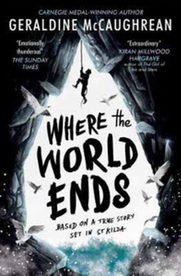Where the World Ends
 Geraldine McCaughrean
Geraldine McCaughrean
Inspired by the bleak islands of St Kilda and the true story of a group who were stranded on one of its stone stacks for nine months, the book is set in an environment that is hard to comprehend in terms of its harshness and desolation.
In McCoughrean’s story nine boys and three men set off on an annual bird hunting expedition – a frantic few weeks of hunting down as many birds as possible to keep their island in food and oil for the winter. But when the season draws to a close no-one comes to collect them and they are forced to survive through the harsh winter on the inhospitable stony crags of the remote island.
The only explanation some of the boys can find is that the world has ended and they have been left behind. This is the story of that harsh winter, the shifts in power within the group and their strategies for survival.
It is bleak but compelling and highly unusual. It is also quite a difficult read – both in terms of subject matter and language – and while undoubtable well written I find it hard to picture the child I would recommend it to. Having read all the Carnegie shortlisted books with my daughter we were both surprised when it won the Carnegie Medal (2018) just simply in terms of its accessibility.
McCaughrean is unapologetic about its challenging nature castigating publishers for dumbing down children’s books in search of accessibility. I have sympathy for her view that young readers “should be bombarded with words” and that words are mastered by coming across them not by being steered away from them. Still it is definitely a book for a more confident reader, comfortable with being challenged.
